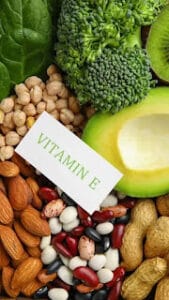The Benefits of Vitamin E
Vitamin E is a powerful antioxidant that plays an important role in maintaining overall health. Often referred to as the “skin vitamin,” its benefits extend far beyond skincare, impacting immunity, heart health, vision, and even cognitive function. In this article, we’ll explore the science-backed benefits of vitamin E, its best sources, and how to incorporate it into your daily routine.
What Is Vitamin E?
Vitamin E is a fat-soluble nutrient which have potent antioxidant properties. It is present in different forms, but alpha-tocopherol is the most active in humans. Antioxidants like vitamin E neutralize free radicals which are unstable molecules that damage cells, accelerate aging, and contribute to chronic diseases.
Top Benefits of Vitamin E
Benefits Of Vitamin E For Men’s Health
Boosts Fertility and Reproductive Health
One of the most significant benefits of Vitamin E for men is its positive impact on reproductive health. It improves sperm quality by reducing oxidative stress, which can damage sperm cells and lead to infertility. Studies suggest that Vitamin E supplementation can enhance sperm motility and increase the chances of conception.
Improves Prostate Health
The prostate is a vital gland in men’s health, and Vitamin E may help reduce the risk of prostate-related issues, including benign prostatic hyperplasia (BPH) and prostate cancer. Its antioxidant properties protect prostate cells from oxidative stress, promoting long-term wellness.
Supports Testosterone Levels
Testosterone is a hormone responsible for muscle growth, libido, and overall energy levels. Vitamin E plays a role in balancing hormones and preventing oxidative damage to the endocrine system, which may help maintain healthy testosterone levels.
Benefits Of Vitamin E In Women’s Health
Supports Hormonal Balance and Menstrual Health
Fluctuation in hormone levels can lead to mood swings, fatigue, and irregular menstrual cycles. Vitamin E plays a role in regulating hormones, which can help reduce PMS symptoms such as cramps, bloating, and irritability. It is also beneficial during menopause, as it helps ease symptoms like hot flashes and night sweats.
Enhances Fertility and Pregnancy Health
For women trying to conceive, Vitamin E is essential for reproductive health. It improves egg quality and promotes a healthy uterine environment for implantation. During pregnancy, it helps in fetal development, particularly in the formation of the baby’s brain and nervous system. It also reduces the risk of preeclampsia, a pregnancy complication.
Supports Bone and Joint Health
As the age of women increases, her bone health become a major concern. Vitamin E helps protect bones from oxidative damage and inflammation, reducing the risk of osteoporosis and arthritis. It also plays a role in muscle recovery, making it beneficial for active women who engage in regular exercise.
Powerful Antioxidant Protection
Vitamin E is known for its potent antioxidant properties, By reducing oxidative stress, it may lower the risk of chronic diseases such as heart disease, cancer, and neurodegenerative disorders.
Promotes Healthy Skin
Vitamin E is a skincare superstar due to its ability to Promotes Skin Health .One of the most well-known benefits of Vitamin E is its role in maintaining youthful and healthy skin. It reduces inflammation, helping with conditions like eczema and psoriasis. It Moisturize and repair dry, damaged skin. It Protect against UV damage by reducing oxidative stress from sun exposure. It speed up wound healing by supporting cell regeneration. Many skincare products include vitamin E for its anti-aging effects, as it helps diminish wrinkles and fine lines and sun damage.
Boosts Immune Function
Vitamin E strengthens the immune system, Studies show it enhances T-cell function, which is vital for fighting infections. Adequate vitamin E intake may help reduce the risk of viral and bacterial illnesses.
Supports Heart Health
By preventing oxidative damage to cholesterol which is a key factor in artery clogging, vitamin E may Improve blood vessel function. It Reduce LDL (bad cholesterol) oxidation and this reduces plaque buildup in the arteries, improving blood flow and lowering the risk of heart attacks and strokes. However, high-dose supplements should be taken with caution, consult a doctor before starting any regimen.
Enhances Eye Health
Vitamin E helps protect eye cells from free radical damage, lowering the risk of age-related macular degeneration (AMD) and cataracts.
May Improve Cognitive Function
Vitamin E’s antioxidant effects may Protect brain cells from damage, slow cognitive decline in older adults. Vitamin E helps protect brain cells from oxidative stress, potentially reducing the risk of Alzheimer’s disease and dementia. It also enhances memory and mental clarity, making it an important nutrient for long-term brain health.
Supports Hair Growth
Vitamin E enhances scalp blood circulation, due to which oxidative stress on hair follicles reduces, and breakage of hair decreases. Applying vitamin E oil or consuming it through diet can lead to stronger, shinier hair.
May Reduce Cancer Risk
While more research is needed, some studies indicate that vitamin E’s antioxidant properties may help prevent certain cancers, particularly prostate and breast cancer, by protecting DNA from damage.
Best Sources of Vitamin E
Since the body can’t produce vitamin E, it must be obtained through diet or supplements. Top food sources include:
Nuts & Seeds: Almonds, sunflower seeds, hazelnuts
Oils: Wheat germ oil, sunflower oil, olive oil
Leafy Greens: Spinach, Swiss chard
Fruits: Avocados, kiwis, mangoes
Fortified Foods: Cereals, plant-based milk
For those with deficiencies, supplements (like alpha-tocopherol capsules) can help—but always consult a healthcare provider first.
Vitamin E Deficiency: Who’s at Risk?
Deficiency of vitamin E is very rare but can be occur in people with:
Fat malabsorption disorders (Crohn’s disease, cystic fibrosis)
Very low-fat diets
Genetic abnormalities affecting vitamin E metabolism
Symptoms include muscle weakness, vision problems, and impaired immunity.
Potential Side Effects & Precautions
Vitamin E is generally safe, but excessive supplementation (over 1,000 mg/day) may cause:
Bleeding risks (due to blood-thinning effects)
Nausea, diarrhea, or headaches
Interference with certain medications (blood thinners, chemotherapy drugs)
Always stick to recommended doses and consult a doctor before taking high doses.
Final Thoughts
Vitamin E is a nutrient with far-reaching benefits for men and women, skin, immunity, heart health, and more. Whether through a balanced diet or targeted supplementation, ensuring adequate intake can significantly enhance overall well-being.

